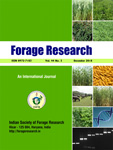SEVA NAYAK DHEERAVATHU*, MANOJ CHAUDHARY, NILAMANI DIKSHIT, MANASA VAKADA, SRINIVASAN R, USHA T. N, THULASI BAI VADITHE, SAIDA NAIK VADITHE, VIJAYA KUMAR G, BANDEPPA SONTH AND SATPAL
ICAR-Indian Institute of Millets Research, Rajendra Nagar, Hyderabad (Telangana), India
ICAR- Indian Agricultural Research Institute, Gauria Karma, Hazaribagh-825405 (Jharkhand), India
ICAR- Indian Grassland and Fodder Research Institute, Jhansi (Uttar Pradesh), India
Indian Institute of Rice Research, Rajendra Nagar, Hyderabad (Telangana), India
Zonal Agricultural and Horticultural Research Station, Keladi Shivappa Nayaka University of
Agricultural and Horticultural Sciences, Shivamogga (Karnataka), India
Department of Microbiology, Acharya Nagarjuna University, Guntur (Andhra Pradesh), India
ANGRAU-Agricultural Research Station, Jangameswarapuram, Guntur (Andhra Pradesh), India
ANGRAU-Agricultural College, Bapatla, Guntur (Andhra Pradesh), India
Forage Section, Deptt. of G&PB, CCS Haryana Agricultural University, Hisar-125 004 (Haryana), India
*(e-mail : sevanayak2005@gmail.com)
(Received : 10 December 2022; Accepted : 30 December 2022)
SUMMARY
Climate change is a global phenomenon and is occurring continuously since the earth came into existence. Soil is the most important renewable natural resource. It is the medium of plant growth and supports different types of living organisms on the earth. Climate change is threatening the food, fodder and nutritional security globally. Countries like India are more vulnerable in view of
the varied physiographic features viz. different types of soils, topography, land slope and local climate that influence the form and species composition of plant communities. Climate change is projected to have significant impact on agriculture production, productivity and livestock production. It is anticipated that global climate change would have a variety of consequences on soil processes and properties which are very important for restoring soil fertility and productivity. Climate change predominantly effects soils by altering soil moisture conditions, enhancing soil temperature, carbon dioxide levels and salt accumulation. In this review we highlighted about the effect of elevated salt ions, phytodesalination, CO2 and temperature on soil health and forage crops.
Key words: Climate change, forage crops, soil health, soil salinity

